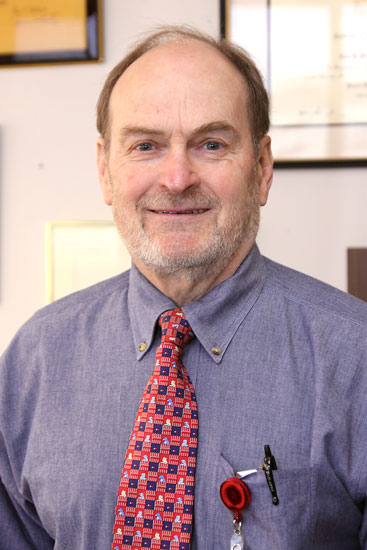 Alan Percy, M.D., Director of the Rett syndrome clinicChildren’s of Alabama and the University of Alabama at Birmingham Department of Pediatrics have announced the creation, upon University of Alabama System Board of Trustees’ approval, of the Sarah Katherine Bateh Endowed Professorship in Rett Syndrome as a result of a unique collaboration with the family and friends of a young patient battling the neurological condition. Marie and Brian Bateh of Hoover, parents of 7-year-old Sarah Katherine “Suki” Bateh, raised $500,000 to create the first endowed professorship for Rett syndrome at UAB. These funds have been matched by Children’s and UAB to support the future holder of this new position.
Alan Percy, M.D., Director of the Rett syndrome clinicChildren’s of Alabama and the University of Alabama at Birmingham Department of Pediatrics have announced the creation, upon University of Alabama System Board of Trustees’ approval, of the Sarah Katherine Bateh Endowed Professorship in Rett Syndrome as a result of a unique collaboration with the family and friends of a young patient battling the neurological condition. Marie and Brian Bateh of Hoover, parents of 7-year-old Sarah Katherine “Suki” Bateh, raised $500,000 to create the first endowed professorship for Rett syndrome at UAB. These funds have been matched by Children’s and UAB to support the future holder of this new position.
Alan Percy, M.D., professor and director of UAB’s Rett syndrome clinic at Children’s, is considered one of the world’s leading experts on this unique developmental disorder that affects one in every 10,000 female births worldwide. Rett syndrome causes severe cognitive impairment, including loss of communication and motor skills, reduced growth and unusual breathing patterns. Percy is also a national leader in pediatric neurology and genetics, and highly regarded as a clinician and research scientist. Working with genetic researcher Huda Y. Zogbhi, M.D., Percy diagnosed the first confirmed case of Rett syndrome in the United States in 1983.
“Children’s and UAB have a strong mutual interest in making sure that Suki receives the very best clinical care, while at the same time advancing new knowledge to create a brighter future for all children and families affected by Rett,” said Mike Warren, Children’s CEO and President. “The Batehs’ remarkable gift helped galvanize our collaborative efforts to take this giant leap forward.”
Soon after making that career-defining first diagnosis, Percy and his associates at Texas Children’s Hospital in Houston began receiving phone calls about other girls who showed similar traits. By the end of that decade, they had established a Rett clinic and were following more than 150 patients from around the country. In 1992, Percy came to Birmingham as director of the UAB’s Civitan-Sparks Clinics, which provide services to patients with developmental disorders, and director of the Division of Pediatric Neurology at UAB. He soon established a clinic to treat Children’s of Alabama patients, where today he provides care to Sarah Katherine Bateh and other Rett patients for much of the region.
“People have asked me many times how I came to Rett syndrome and I tell them, ‘I didn’t come to Rett syndrome; Rett syndrome came to me,’” he said. Children’s and UAB operate one of the few Rett clinics in the U.S. Since 2003, Percy has led an NIH-funded natural history study of Rett patients.
 The Batehs founded the Suki Foundation and have hosted the popular “Raise the Roof for Rett” event and other events annually to raise funds and awareness for Rett research. The Suki Foundation was created in honor of Sarah Katherine, who was diagnosed with Rett syndrome at age 2. The foundation aims to make a difference in the lives of children diagnosed with Rett syndrome through raising funds to expand and accelerate research efforts at Children’s. Research focuses on better understanding of Rett syndrome, new treatments and, ultimately, a cure.
The Batehs founded the Suki Foundation and have hosted the popular “Raise the Roof for Rett” event and other events annually to raise funds and awareness for Rett research. The Suki Foundation was created in honor of Sarah Katherine, who was diagnosed with Rett syndrome at age 2. The foundation aims to make a difference in the lives of children diagnosed with Rett syndrome through raising funds to expand and accelerate research efforts at Children’s. Research focuses on better understanding of Rett syndrome, new treatments and, ultimately, a cure.
“We have an unprecedented and historic opportunity to fund crucial new research,” said Brian Bateh. “The gene that causes Rett syndrome has been found and a landmark study demonstrated the reversibility of Rett symptoms in mice. Rett syndrome has a known genetic link. It is being characterized as the ‘Rosetta Stone,’ a key that will help unlock treatments and cures for other disorders, including autism, schizophrenia, Alzheimer’s, Parkinson’s, anxiety, and autonomic nervous system disorders. With Suki Foundation fundraising efforts, so many lives can be changed by providing support and helping to find a cure for more than just those diagnosed with Rett syndrome. So many lives could be changed with a cure.”
Thanks to the Batehs’ gift, UAB and Children’s now have resources dedicated to recruit and support additional medical talent to join Percy to advance this critical work.
For more information, visit sukifoundation.org, uab.edu or childrensal.org.